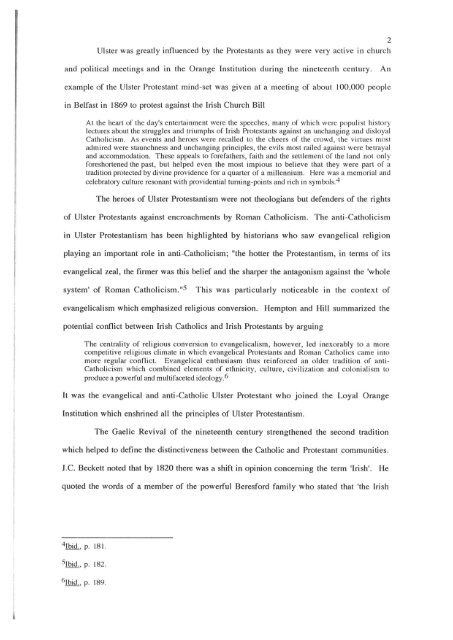TRANSPLANTED IRISH INSTITUTIONS - University of Canterbury
TRANSPLANTED IRISH INSTITUTIONS - University of Canterbury
TRANSPLANTED IRISH INSTITUTIONS - University of Canterbury
Create successful ePaper yourself
Turn your PDF publications into a flip-book with our unique Google optimized e-Paper software.
2<br />
Ulster was greatly influenced by the Protestants as they were very active in church<br />
and political meetings and in the Orange Institution during the nineteenth century.<br />
An<br />
example <strong>of</strong> the Ulster Protestant mind-set was given at a meeting <strong>of</strong> about 100,000 people<br />
in Belfast in 1869 to protest against the Irish Church Bill<br />
At the heart <strong>of</strong> the day's entertainment were the speeches, many <strong>of</strong> which were populist history<br />
lectures about the struggles and triumphs <strong>of</strong> Irish Protestants against an unchanging and disloyal<br />
Catholicism. As events and heroes were recalled to the cheers <strong>of</strong> the crowd, the virtues most<br />
admired were staunchness and unchanging principles, the evils most railed against were betrayal<br />
and accommodation. These appeals to forefathers, faith and the settlement <strong>of</strong> the land not only<br />
foreshortened the past, but helped even the most impious to believe that they were part <strong>of</strong> a<br />
tradition protected by divine providence for a quarter <strong>of</strong> a millennium. Here was a memorial and<br />
celebratory culture resonant with providential turning-points and rich in symbols. 4<br />
The heroes <strong>of</strong> Ulster Protestantism were not theologians but defenders <strong>of</strong> the rights<br />
<strong>of</strong> Ulster Protestants against encroachments by Roman Catholicism. The anti-Catholicism<br />
in Ulster Protestantism has been highlighted by historians who saw evangelical religion<br />
playing an important role in anti-Catholicism; "the hotter the Protestantism, in terms <strong>of</strong> its<br />
evangelical zeal, the firmer was this belief and the sharper the antagonism against the 'whole<br />
system' <strong>of</strong> Roman Catholicism."s<br />
This was particularly noticeable in the context <strong>of</strong><br />
evangelicalism which emphasized religious conversion. Hempton and Hill summarized the<br />
potential conflict between Irish Catholics and Irish Protestants by arguing<br />
The centrality <strong>of</strong> religious conversion to evangelicalism, however, led inexorably to a more<br />
competitive religious climate in which evangelical Protestants and Roman Catholics came into<br />
more regular conflict. Evangelical enthusiasm thus reinforced an older tradition <strong>of</strong> anti<br />
Catholicism which combined elements <strong>of</strong> ethnicity, culture, civilization and colonialism to<br />
produce a powerful and multifaceted ideology.6<br />
It was the evangelical and anti-Catholic Ulster Protestant who joined the Loyal Orange<br />
Institution which enshrined all the principles <strong>of</strong> Ulster Protestantism.<br />
The Gaelic Revival <strong>of</strong> the nineteenth century strengthened the second tradition<br />
which helped to define the distinctiveness between the Catholic and Protestant communities.<br />
J.e. Beckett noted that by 1820 there was a shift in opinion concerning the term 'Irish'. He<br />
quoted the words <strong>of</strong> a member <strong>of</strong> the powerful Beresford family who stated that 'the Irish<br />
4Ibid., p. 181.<br />
5Ibid., p. 182.<br />
6[bid., p. 189.
















